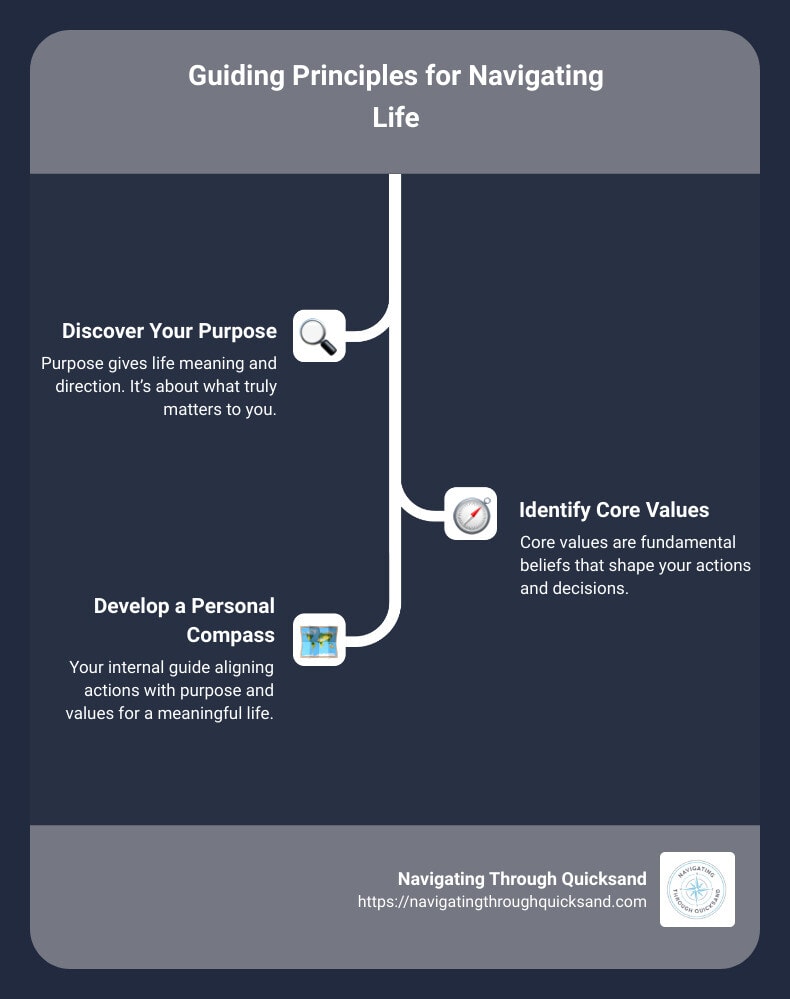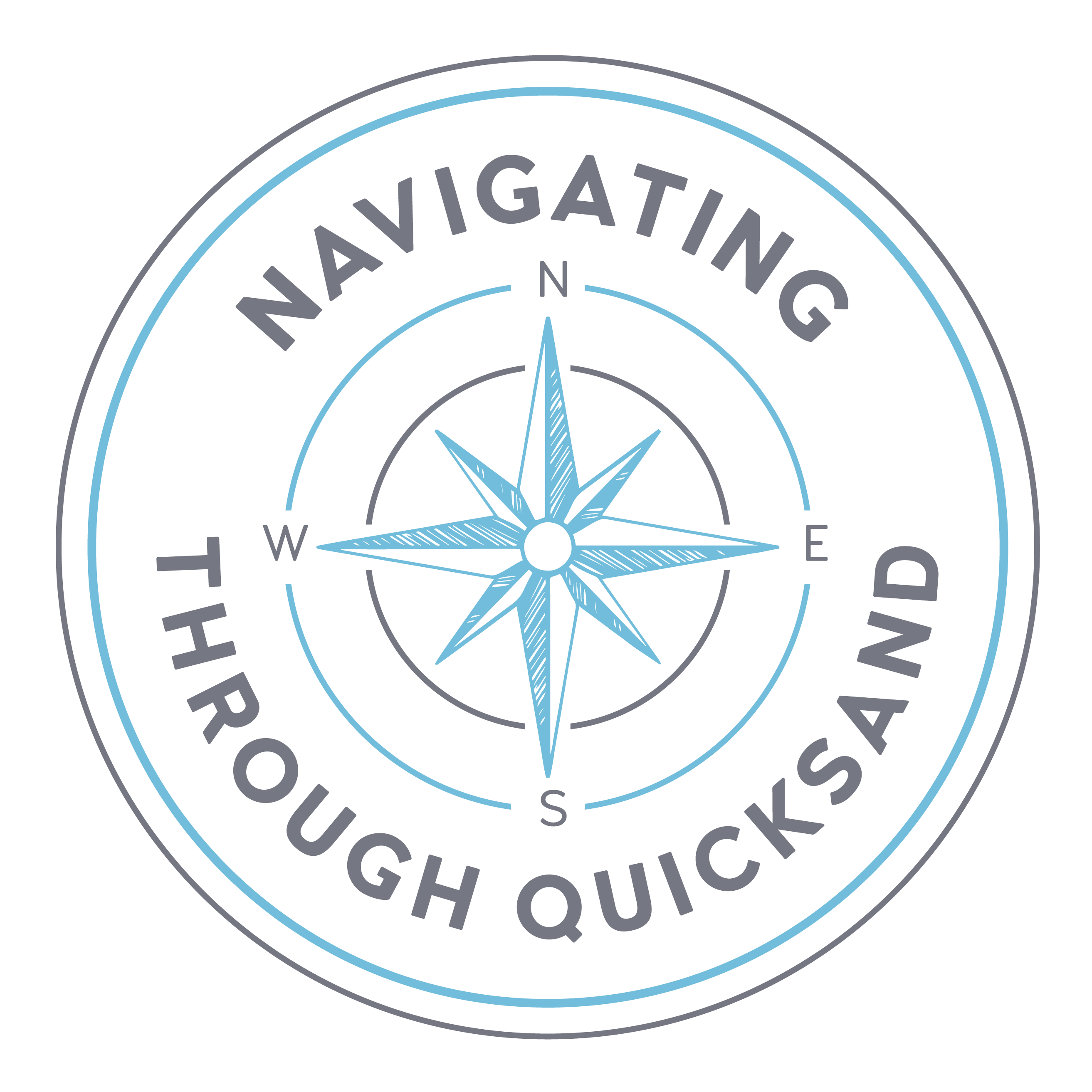Navigating life’s challenges often feels like being stuck in quicksand, but guiding principles like purpose, core values, and a personal compass can transform these obstacles into stepping stones.
Additionally, achieving financial well-being is crucial as it balances personal happiness and purpose with financial success, contributing to overall well-being.
- Purpose gives life meaning and direction. It’s not about predefined paths but about what truly matters to you. As Belle Liang emphasizes, “Having a clear sense of purpose, grounded in core values, can help your students choose the best direction for themselves.”
- Core values are the fundamental beliefs that shape your actions and decisions. They act as the foundation of your personal compass, ensuring you stay true to yourself amid life’s trials and tribulations.
- A personal compass is your internal guide, aligning your actions with your purpose and values. Instead of following a step-by-step plan, like those performance-based approaches often fail to spark real fulfillment, it’s about letting your inner compass steer you towards a meaningful life.
When searching for how to steer life, our primary intention is to find a clear and actionable direction. Here are 3 keys to help guide you on this journey and learn how to navigate life with confidence:
- Find your purpose.
- Identify your core values.
- Develop a personal compass.
Exploring these elements can lead you to a more directed, purposeful, and enriched life journey.

Table of Contents
Understanding the Importance of Navigating Life
Navigating life is a crucial aspect of personal growth and development. It involves making informed decisions, setting goals, and creating a sense of purpose. By understanding the importance of navigating life, individuals can better equip themselves to handle life’s challenges and make the most of their experiences.
When we talk about navigating life, we’re referring to the ability to steer through various phases and obstacles with a clear sense of direction. This process is fundamental to personal growth, as it helps us to continuously evolve and adapt. By setting meaningful goals and making informed decisions, we create a roadmap that guides us towards our aspirations.
Moreover, navigating life is not just about overcoming challenges; it’s about transforming these challenges into opportunities for growth. When we understand the importance of navigating life, we become more resilient and better prepared to face whatever comes our way. This proactive approach allows us to live more intentionally, making the most of every experience and turning our journey into a purposeful adventure.
The Foundation of a Purposeful Journey
Navigating life is the foundation of a purposeful journey. It allows individuals to identify their strengths, weaknesses, and passions, and to use this information to make informed decisions about their lives. By navigating life, individuals can create a sense of direction and purpose, which can lead to greater fulfillment and happiness.
At the heart of a purposeful journey is the ability to navigate life effectively. This means taking the time to understand who you are—your strengths, weaknesses, and passions. By gaining this self-awareness, you can make decisions that are aligned with your true self, leading to a more fulfilling and meaningful life.
When you navigate life with a clear sense of purpose, you create a personal compass that guides your actions and decisions. This compass helps you stay true to your core values, even when faced with difficult choices or unexpected challenges.
As a result, you can move forward with confidence, knowing that you are on a path that is uniquely yours.
Understanding the Purpose Mindset

Navigating life effectively requires more than just setting goals and working hard. It involves adopting a purpose mindset—a way of thinking that focuses on the deeper “why” behind our actions. This approach is crucial for human development, as it helps individuals explore and guide their journey toward self-discovery and finding purpose in their lives. Let’s break down what this means and how it can transform your approach to life.
What is the Purpose Mindset?
A purpose mindset goes beyond the conventional performance and passion mindsets. While the performance mindset emphasizes achieving specific outcomes and the passion mindset focuses on following what you love, the purpose mindset centers on meaningful engagement with life.
Belle Liang and Timothy Klein highlight the importance of this mindset in their book, “How to Steer Life”. They explain that the purpose mindset is about “tapping into the ‘why’ behind what you do,” which can lead to greater fulfillment and resilience. Additionally, supporting young people’s sense of autonomy and self-identity is crucial in fostering a purpose mindset.
Intrinsic Motivation: The Fuel for Purpose
Intrinsic motivation is the internal drive to do something because it is inherently interesting or enjoyable. This type of motivation is crucial for maintaining a purpose mindset. When you are intrinsically motivated, you are more likely to engage deeply and persistently in activities that align with your values and purpose.
Research shows that intrinsic motivation leads to better performance, creativity, and well-being. It’s the difference between doing something because you have to (extrinsic motivation) and doing it because you want to (intrinsic motivation). Cultivating a self driven child involves fostering this intrinsic motivation, which supports young people’s autonomy and self-discovery, guiding them toward understanding and realizing their true identities.
Growth Games vs. Fixed Games
To further understand the purpose mindset, it’s helpful to differentiate between growth games and fixed games.
- Growth Games: These are activities where the primary goal is personal development and learning. Success is measured by improvement and effort rather than by winning or losing. For example, learning a new skill or hobby can be seen as a growth game.
- Fixed Games: These are activities where the goal is to achieve a specific outcome, often in competition with others. Success is measured by fixed standards, such as grades in school or sales targets at work.
The purpose mindset encourages you to approach life as a series of growth games, even when you are competing in fixed games. This shift in perspective can help you stay motivated and resilient, focusing on continuous improvement rather than just outcomes. Practical guidance can play a crucial role in fostering this mindset, supporting students in discovering and pursuing their true purpose.
Applying the Purpose Mindset in Daily Life
To integrate the purpose mindset into your daily life, consider these practical steps:
- Reflect on Your Values: Regularly take time to think about what truly matters to you. This reflection can help you align your actions with your core values and purpose.
- Set Meaningful Goals: Instead of just setting performance-based goals, set goals that are aligned with your purpose. For instance, instead of aiming to get a promotion, aim to make a meaningful impact in your role.
- Accept Challenges: View challenges as opportunities for growth rather than obstacles to success. This mindset can help you stay motivated and resilient in the face of difficulties.
- Celebrate Small Wins: Recognize and celebrate the small steps you take towards your purpose. This can boost your intrinsic motivation and keep you focused on your long-term goals.
By adopting a purpose mindset, you can steer life with a sense of direction and fulfillment, turning everyday actions into meaningful steps towards a purposeful life.
Next, we will explore how to steer life with a personal compass, helping you make decisions that align with your core values and purpose.
Developing Essential Life Skills
Developing essential life skills is a critical aspect of navigating life. These skills include communication, problem-solving, and time management, among others. By developing these skills, individuals can better navigate life’s challenges and make the most of their experiences.
Life skills are the tools that enable us to handle life’s complexities with grace and efficiency. Effective communication allows us to express our thoughts and feelings clearly, fostering better relationships and collaboration. Problem-solving skills enable us to tackle challenges head-on, finding creative solutions to obstacles that arise.
Time management is another crucial skill, helping us to prioritize tasks and make the most of our time. By managing our time effectively, we can achieve our goals without feeling overwhelmed. Additionally, adaptability and resilience are essential for navigating life’s unpredictable nature. These skills help us to bounce back from setbacks and adjust to new circumstances with ease.
Key Skills for Personal and Professional Growth
Some key skills for personal and professional growth include:
- Communication: The ability to effectively communicate with others is essential for personal and professional growth.
- Problem-solving: The ability to solve problems and think critically is critical for navigating life’s challenges.
- Time management: The ability to manage one’s time effectively is essential for achieving goals and making the most of one’s experiences.
- Adaptability: The ability to adapt to changing circumstances is critical for navigating life’s challenges.
- Resilience: The ability to bounce back from setbacks and failures is essential for personal and professional growth.
Each of these skills plays a vital role in our ability to navigate life successfully. Communication helps us to build strong relationships and convey our ideas effectively. Problem-solving and critical thinking enable us to address issues and make informed decisions. Time management ensures that we can balance our responsibilities and achieve our goals.
Adaptability allows us to remain flexible and open to change, which is crucial in today’s fast-paced world. Resilience helps us to recover from setbacks and continue moving forward, even in the face of adversity. By developing these key skills, we can enhance both our personal and professional lives, making us more capable and confident individuals.
How to Steer Life with a Personal Compass

Finding Your True North
Navigating life successfully often starts with finding your True North—your guiding purpose. This isn’t about following a set path but rather using a personal compass that aligns with your core values. According to Belle Liang and Timothy Klein, authors of How to Steer Life, having a clear sense of purpose helps students and professionals alike to make decisions that are true to themselves. Counseling individual students can play a crucial role in helping them discover their true north.
Self-findy is crucial in this process. It’s about understanding your intrinsic motivations and what truly matters to you. This journey of self-findy involves:
- Autonomy: Making choices that are independent and true to your values.
- Emerging Self: Recognizing and nurturing your evolving identity.
A practical tool for this is a decision-making framework based on core values. For example, if one of your core values is helping others, you might pursue careers or activities that allow you to make a positive impact. “Having a clear sense of purpose, grounded in core values, can help your students choose the best direction for themselves.” — Belle Liang
Avoiding Common Pitfalls
While steering your life with a personal compass, avoid common pitfalls. Many fall into the traps of the performance mindset and passion mindset.
- Performance Mindset: This focuses on achieving specific outcomes, like high grades or job promotions. While it can drive success, it often leads to stress and burnout.
- Passion Mindset: This encourages following what you love. However, it can be misleading because passions can change, and not all passions can be turned into careers.
Instead, aim for a purpose mindset. This involves understanding the “why” behind your actions, which can lead to more sustainable and fulfilling success.
Another pitfall to avoid is pathway parenting. Parents often push their children towards traditional markers of success, like top grades or prestigious colleges. This can stifle a child’s autonomy and emerging self. Parents’ fundamental concern is to raise children who lead fulfilling lives, not just achieving financial success but also finding purpose and joy. Instead, encourage exploration and self-findy, allowing them to find their true north.
By focusing on purpose rather than performance or passion, and by supporting autonomy and self-findy, you can steer your life in a direction that is both fulfilling and true to your core values. This approach not only helps in navigating life’s challenges but also in building a meaningful and resilient life.
Next, we’ll dig into how to build a purposeful career path, ensuring your professional journey aligns with your personal values and purpose.
Building Positive Relationships
Building positive relationships is an essential aspect of navigating life. Positive relationships can provide support, guidance, and a sense of belonging, which can be critical for personal and professional growth.
Relationships are the cornerstone of a fulfilling life. They offer us emotional support, practical advice, and a sense of community. Positive relationships can help us navigate life’s ups and downs, providing a network of support that we can rely on.
In both personal and professional contexts, building positive relationships is crucial. These connections can open doors to new opportunities, offer different perspectives, and help us to grow as individuals. By investing time and effort into building and maintaining positive relationships, we create a strong support system that can help us navigate life more effectively.
Cultivating Meaningful Connections
Cultivating meaningful connections with others is essential for building positive relationships. This can involve:
- Active listening: The ability to listen actively and empathetically is critical for building positive relationships.
- Empathy: The ability to understand and relate to others is essential for building positive relationships.
- Trust: The ability to trust others is critical for building positive relationships.
- Communication: The ability to communicate effectively is essential for building positive relationships.
- Shared values: Sharing values and interests with others can help to build positive relationships.
Meaningful connections are built on a foundation of trust, empathy, and effective communication. Active listening allows us to truly understand and connect with others, while empathy helps us to relate to their experiences and emotions. Trust is the glue that holds relationships together, fostering a sense of security and reliability.
Effective communication ensures that we can express ourselves clearly and understand others, reducing misunderstandings and conflicts. Shared values and interests create common ground, making it easier to build and maintain positive relationships. By cultivating these meaningful connections, we can enhance our personal and professional lives, creating a network of support and collaboration that helps us navigate life more successfully.
Building a Purposeful Career Path
Future-Proofing Your Skills
Career paths are no longer linear. Instead of climbing a single mountain, think of your career as a road trip with many potential detours and destinations. This requires future-proofing your skills to stay adaptable and resilient. Attending seminars like those led by educators from the Lynch School of Education and Human Development at Boston College can help you find your purpose and take a holistic approach to your education and career.
To future-proof your skills, focus on becoming a creator, facilitator, or driver:
- Creator: Innovate and bring new ideas to life. This could be through developing new products, services, or solutions.
- Facilitator: Help others succeed by creating environments that foster collaboration and growth. This role is essential in team settings and project management.
- Driver: Take charge and lead initiatives. Whether it’s managing a team or spearheading a project, drivers ensure goals are met effectively.
By diversifying your skillset, you can steer career changes more smoothly and seize unexpected opportunities.
Adding Value in Your Role
No matter your job title, adding value is key to a fulfilling career. You can do this by adopting one of the following roles: Trailblazer, Builder, Champion, or Guardian. Engaging with parents, educators, and other caring adults can further enhance these roles by providing guidance and support.
- Trailblazer: Be the first to explore new areas and set trends. Trailblazers are innovators who push boundaries.
- Builder: Focus on constructing and improving systems, processes, or products. Builders are detail-oriented and ensure that everything functions optimally.
- Champion: Advocate for causes, projects, or people you believe in. Champions are passionate and inspire others to join their cause.
- Guardian: Protect and maintain the core values and integrity of your organization. Guardians ensure that ethical standards are upheld.
By understanding and embracing these roles, you can add significant value to your workplace and find greater personal satisfaction.
Career Navigation
Navigating your career intentionally is crucial. This means being proactive about your career moves and keeping an open mind to change. According to a Harvard Business Review article, think of your career as an iterative process, much like a road trip. Be open to spontaneous detours and exploration, as these can lead to unexpected growth and opportunities.
Key steps for intentional career navigation:
- Set Clear Goals: Know what you want to achieve but remain flexible.
- Seek Experiences: Gain diverse experiences to broaden your skillset and perspectives.
- Reflect and Adapt: Regularly assess your progress and be willing to pivot when necessary.
By following these steps, you can build a career path that is both intentional and adaptable to change.
Next, we’ll explore how to thrive in a rapidly changing world by establishing key habits for success and engaging in new experiences.
Thriving in a Rapidly Changing World

Key Habits for Success
In a world that changes quickly, having the right habits can help you stay stable and reach your long-term goals. When life gets busy, focusing on a few key habits can keep you on track and reduce stress.
- Personal Reflection: Spend a few minutes each day thinking about your actions and feelings. This can help you understand what works for you and what doesn’t.
- Physical and Mental Health: Exercise regularly and practice mindfulness or meditation to keep your body and mind in good shape.
Weekly Habits:
- Professional Reflection: Look back on your week’s work. What did you achieve? What can you improve? This helps you stay focused on your career goals.
- Building Relationships: Take time each week to connect with friends, family, and colleagues. Strong relationships provide support and new opportunities.
By sticking to these habits, you can add stability to your life and stay aligned with your long-term goals, even when things get hectic.
Engaging in New Experiences for Positive Youth Development
New experiences are vital for both career and personal growth. They help you adapt to change and find new interests and skills.
Career Growth:
- Seek Diverse Experiences: Don’t stick to just one type of job or role. Try different projects and tasks to build a broad skillset.
- Be Open to Change: Sometimes, taking a different path can lead to unexpected opportunities. Be willing to pivot if needed.
Personal Growth:
- Try New Activities: Whether it’s a new hobby, volunteer work, or travel, new activities can help you learn more about yourself and the world.
- Meet New People: Engaging with people from different backgrounds can provide fresh perspectives and ideas.
By embracing new experiences, you can grow both professionally and personally, making you more adaptable and resilient in a rapidly changing world.
Conclusion
Navigating life can often feel like moving through quicksand. But with the right tools and mindset, we can turn life’s challenges into strengths.
Contact us today at Navigating Through Quicksand, we focus on empowering individuals to do just that.
Our approach is simple: we help you find your purpose and use it as a guiding star. Whether you’re a student, a professional, or a parent, understanding your core values and aligning them with your actions can transform your life.
Empowering Individuals
We believe in the power of self-discovery and intrinsic motivation. Our workshops, coaching sessions, and speaking engagements are designed to help you uncover what truly drives you. By focusing on your personal compass, you can make decisions that are true to who you are.
Turning Adversities into Strengths
Life is full of challenges, but each obstacle is an opportunity for growth. Our unique selling proposition is helping individuals steer through these adversities. We teach you how to move deliberately and purposefully, much like navigating through quicksand. This approach not only helps you overcome challenges but also turns them into stepping stones towards success.
Final Thoughts
Navigating life is an ongoing journey. By focusing on your purpose and using it to guide your decisions, you can lead a fulfilling and meaningful life. At Navigating Through Quicksand, LLC, we’re here to support you every step of the way.
Find your purpose. Steer through challenges. Turn adversities into strengths.
For more information on how we can help you steer life, visit our website or contact us to book a session. Let’s turn life’s quicksand into solid ground, together.
Frequently Asked Questions about How to Steer Life
How to steer life summary?
Steering your life involves aligning your actions with your purpose and core values. It’s about using your personal compass to make informed decisions that lead you towards meaningful goals. Your purpose is a translatable quality that can guide you in every aspect of life, from school to career to personal relationships.
What does navigating life mean?
Navigating life means using your personal compass to find direction. This compass is built on your core values and helps you make choices that are true to who you are. It’s about understanding your self and what drives you. When you know your core values, you can make decisions that lead to a fulfilling and purpose-driven life.
How can I find my purpose?
Finding your purpose involves several steps:
- Self-Findy: Spend time understanding yourself. Reflect on what activities make you feel fulfilled and why.
- New Experiences: Engage in diverse activities and roles. This helps you find what you enjoy and what you’re good at.
- Intrinsic Motivation: Focus on what internally motivates you rather than external rewards. Ask yourself what makes you feel genuinely happy and satisfied.
- Reflect: Think about your experiences and how they have shaped your values and worldview. This will help you gain insight into what truly matters to you.
By following these steps, you can uncover your purpose and use it as a guiding star in all areas of your life.
Our Content
Our content is carefully created and edited by Ashley Gustafson to ensure that the content is accurate, reliable, and up-to-date. Navigating Through Quicksand, LLC is a trusted inspirational woman, inspirational speaker, and personal development coach in Massachusetts for confidence coaching programs, training sessions, athletic training for varsity teams, support for collegiate athletes, and more. Navigating Through Quicksand, LLC has empowered individuals with over 15 years of experience working with students and athletic teams from local communities.



